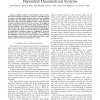Free Online Productivity Tools
i2Speak
i2Symbol
i2OCR
iTex2Img
iWeb2Print
iWeb2Shot
i2Type
iPdf2Split
iPdf2Merge
i2Bopomofo
i2Arabic
i2Style
i2Image
i2PDF
iLatex2Rtf
Sci2ools
114
Voted
TROB
2008
2008
Convergence-Preserving Switching for Topology-Dependent Decentralized Systems
Abstract-- Stability analysis of decentralized control mechanisms for networked, coordinating systems has generally focused on specific controller implementations, such as nearest neighbor and other types of proximity graph control laws. This approach often misses the need for the addition of other control structures to improve global characteristics of the network. An example of such a situation is the use of a Gabriel graph, which is essentially a nearest neighbor rule modified to ensure global connectivity of the network if the agents are pairwise connected through their sensor inputs. We present a method of ensuring provable stability of decentralized switching systems by employing a hysteresis rule that uses a zero-sum consensus algorithm. We demonstrate the application of this result to several special cases, including nearest neighbor control laws, Gabriel graph rules, diffuse target tracking, and hierarchical, heterogeneous systems.
| Added | 15 Dec 2010 |
| Updated | 15 Dec 2010 |
| Type | Journal |
| Year | 2008 |
| Where | TROB |
| Authors | Brian Shucker, Todd D. Murphey, John K. Bennett |
Comments (0)

